
Joe South was an American singer-songwriter, guitarist, and record producer. Best known for his songwriting, South won the Grammy Award for Song of the Year in 1970 for "Games People Play" and was again nominated for the award in 1972 for "Rose Garden".

Billy Joe Royal was an American country soul singer. His most successful record was "Down in the Boondocks" in 1965.

"Hush" is a song written by American composer and musician Joe South, for recording artist Billy Joe Royal. The song was later covered by Somebody's Image in 1967. It reached #15. It was also covered by Deep Purple in 1968 and by Kula Shaker in 1997. Each artist had a Top 5 hit with their version.

"Medley: Aquarius/Let the Sunshine In " is a medley of two songs written for the 1967 musical Hair by James Rado and Gerome Ragni (lyrics), and Galt MacDermot (music), released as a single by American R&B group the 5th Dimension. The song spent six weeks at number one on the US Billboard Hot 100 pop singles chart in the spring of 1969 and was eventually certified platinum in the US by the RIAA. Instrumental backing was written by Bill Holman and provided by session musicians commonly known as the Wrecking Crew. The actual recording was novel at the time, being recorded in two cities, Los Angeles and Las Vegas, and being mixed down to a final version later.

"Ain't Nothing Like the Real Thing" is a 1968 single released by American R&B/soul duo Marvin Gaye and Tammi Terrell, on the Tamla label in 1968. The B-side of the single is "Little Ole Boy, Little Ole Girl" from the duo's United LP. The first release off the duo's second album: You're All I Need, the song - written and produced by regular Gaye/Terrell collaborators Ashford & Simpson - became a hit within weeks of release eventually peaking at number 8 on the Billboard Hot 100 and number 1 on the Hot Soul Singles chart, the first of the duo's two number 1 R&B hits. In the UK "Ain't Nothing Like the Real Thing" reached number 34.
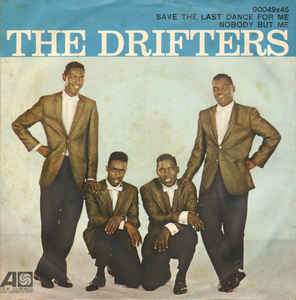
"Save the Last Dance for Me" is a song written by Doc Pomus and Mort Shuman, first recorded in 1960 by the Drifters, with Ben E. King on lead vocals. It has since been covered by several artist including Dalida, The DeFranco Family, Emmylou Harris, Dolly Parton, and Michael Bublé.

"Go Away Little Girl" is a popular song written by Gerry Goffin and Carole King. It was first recorded by Bobby Vee for Liberty Records on March 28, 1962. The lyrics consist of a young man asking a young attractive woman to stay away from him, so that he will not be tempted to betray his steady girlfriend by kissing her. The song is notable for making the American Top 20 three times: for Steve Lawrence in 1963, for The Happenings in 1966, and for Donny Osmond in 1971. It is also the first song, and one of only nine, to reach US number 1 by two different artists.
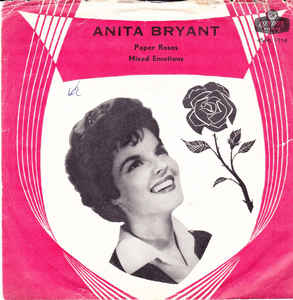
"Paper Roses" is a popular song written and composed by Fred Spielman and Janice Torre. It first was a top five hit in 1960 for Anita Bryant. Marie Osmond recorded it in 1973 and took her version to number one on the US country chart.
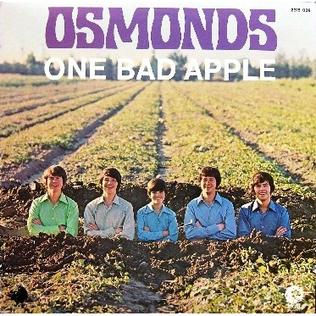
"One Bad Apple" was a No. 1 hit single released by The Osmonds on November 14, 1970. It debuted on the Billboard Hot 100 on January 2, 1971. It hit the top of the chart on February 13, 1971 and stayed there for five weeks. It also reached No. 6 on the R&B chart. Billboard ranked it as the No. 4 song for 1971. Both "One Bad Apple" and the Donny Osmond-credited single "Sweet and Innocent" are on the 1970 album Osmonds. It was certified Gold by the RIAA on February 4, 1971.
"Feelin' Alright?", also known as "Feeling Alright", is a song written by Dave Mason of the English rock band Traffic for their eponymous 1968 album Traffic. It was also released as a single, and failed to chart in both the UK and the US, but it did reach a bubbling under position of #123 on the Billboard Hot 100. Joe Cocker performed a more popular rendition of the song that did chart in the U.S. Both Traffic's and Cocker's versions appear in the 2012 movie Flight. The song had also been featured in the 2000 film Duets, sung by Huey Lewis.

"Hey Girl" is a song written and composed by Gerry Goffin and Carole King. It first became a popular Top ten hit on the Billboard Hot 100 in August 1963 when recorded by Freddie Scott. Donny Osmond took the song back to the Billboard top ten chart with his cover in 1971. Billy Joel recorded a version of the song for his 1997 album Greatest Hits Volume III.
"Rose Garden" is a song written in 1967 by American singer-songwriter Joe South. It was first recorded by Billy Joe Royal on his 1967 studio album Billy Joe Royal Featuring "Hush". Versions by South himself and Dobie Gray appeared shortly after the original. Gray's version became a minor hit in North America in 1969.
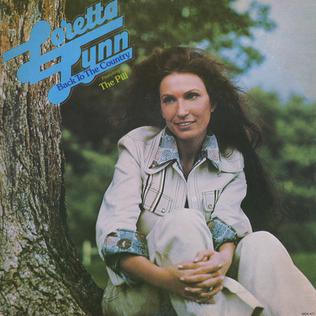
Back to the Country is the twenty-fifth solo studio album by American country music singer-songwriter Loretta Lynn. It was released on February 3, 1975, by MCA Records.

"I'm Your Puppet" is a song written by Dan Penn and Spooner Oldham; the best known version is the one recorded by James & Bobby Purify which reached #5 on the US R&B chart and #6 on the Billboard Hot 100 in 1966. The single was nominated for a Grammy Award for Best R&B Performance by a Duo or Group with Vocals in 1967. The song was featured on their 1967 album, James & Bobby Purify.

"I Knew You When" is a song written and composed by Joe South. It became a popular hit in 1965 when recorded by American pop and country singer Billy Joe Royal. There have also been several other hit cover versions of this song, including by Donny Osmond and Linda Ronstadt.
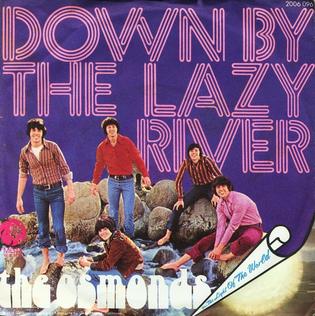
"Down by the Lazy River" is a song written by Alan and Merrill Osmond and performed by The Osmonds, it was produced by Alan Osmond and Michael Lloyd "Down By the Lazy River" was released on January 15, 1972 and appeared on the band's 1972 album, Phase III. It was certified Gold by the RIAA on March 24, 1972. In 2021, the song was featured in the South Park episode "South ParQ Vaccination Special".
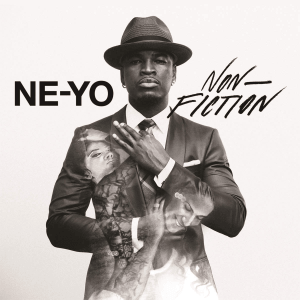
Non-Fiction is the sixth studio album by American recording artist Ne-Yo. The album was released on January 27, 2015, by Motown Records, serving as the follow-up to his fifth album R.E.D. (2012). The album was preceded by two singles: "Money Can't Buy" featuring Jeezy and "She Knows" featuring Juicy J.

Phase III is the third studio album by the American singing group The Osmonds, released in 1972. The album reached number ten on the Billboard Top LPs chart on March 11, 1972. Two singles released from the album, "Yo-Yo" and "Down by the Lazy River", reached No. 3 and No. 4 on the Billboard Hot 100 singles chart, respectively. The album was certified Gold by the RIAA on May 29, 1972.

The Plan is the fifth studio album by The Osmonds, released in 1973. The album contains songs that are about the Mormon faith; its name derives from the Plan of Salvation, a key tenet of the Mormon faith. It reached number 58 on the Billboard Top LPs chart. Two of the album's singles, "Goin' Home" and "Let Me In", both peaked at number 36 on the Billboard Hot 100. The album's third single, "Movie Man", did not chart.

Love Me for a Reason is the sixth studio album by The Osmonds, released in 1974. The album peaked at No. 47 on the Billboard Top LPs chart. Two singles were released from the album: the title track "Love Me for a Reason" and "Having a Party".


















